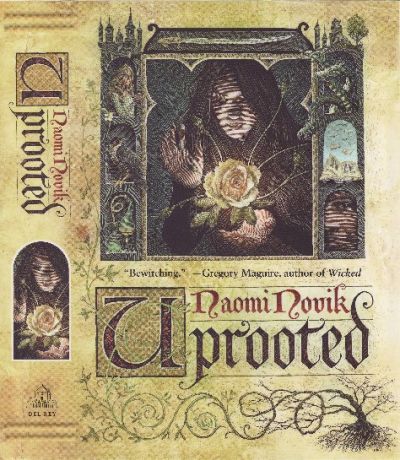A Malice of Trees
Uprooted
By Naomi Novik

2 Jul, 2016
0 comments
Naomi Novik’s 2015 novel Uprooted earned her a second Hugo nomination and her first Nebula Award. It has also been nominated for the Mythopoeic Award and the British Fantasy Award. Obviously this is my chance to be the lone voice of reason and taste, disappointed in a popular choice.
The only problem with that strategy is that I enjoyed Uprooted.
In exchange for protection from the Wood and its many monsters, Dvernik and other towns of the valley tithe young women to the Dragon. This is not quite as bad as it sounds; the Dragon is a magician, not a great beast, and while it is not exactly clear to what purpose he puts the young women, they emerge from ten years of service alive, unsullied (according to the young women; their relatives assume otherwise) and rich enough to buy husbands despite their infamous past. None of the tribute maidens remain in Dvernik for long. Whatever their duties have entailed, their experience has transformed them into people who cannot return to village life.
Even though there are never very many young women who fit the Dragon’s exacting criteria — seventeen years of age, born in a tithing year — Agnieszka should feel safe. After all, she is a lanky, clumsy girl of no obvious charm or skill, whereas her friend Kasia has been raised from birth to be exactly the sort of bold, useful girl the Dragon likes.
But it’s Agnieszka who catches the Dragon’s attention and Agnieszka who is taken away to serve the Dragon.
Not that the Dragon seems particularly pleased with his choice, at least not at first. If there is a checklist of characteristics the Dragon would not want in a servant, Agnieszka probably has most of them. It’s not until Agnieszka reveals an unusually high aptitude for magic that she seems worth the bother. Even then the Dragon is frustrated by the gulf between his methodical approach to magic and her more intuitive methods.
As poorly suited as they are to each other, there is a reason for the Dragon to persist in teaching Agnieszka. The Dragon is a loyal subject of the state of Polnya and Polnya needs all the mages it can find and train. It is intermittently at war with neighboring Rosya; it is also threatened by the magical Wood that is powerful, malevolent, and intent on expanding its territory.
The Dragon’s persistence pays off when Agnieszka rescues Kasia from the Wood; before now, the Wood has never been forced to surrender someone it took. News of Agnieszka’s achievement brings bold Prince Marek to the Dragon’s castle to propose a daring scheme: rescue Marek’s long-lost mother from the heart of the Wood itself.
Alas, Prince Marek is brave and bold, but not bright.…
~oOo~
This tale is, of course, cousin to Beauty and the Beast (even though Agnieszka is not deemed a beauty and the Dragon is more beastly than beast).
The rivalry between Polnya and Rosya seems to have been inspired by the many conflicts between Poland and Russia, but it’s not a one-to-one mapping. For one thing, vast, evil forests have not traditionally played a role in international politics1. Moreover, while Novik clearly draws on the old Polish-Lithuanian Commonwealth, she doesn’t burden readers with the details. Though she does suppose an elected monarch, which is a refreshing change from the usual secondary world absolute monarchy.
The Polnyan aristocracy comes off rather poorly in this book; not only do they treat the lower classes worse than they do their horses, but they make some extraordinarily stupid decisions. I cannot help but feel some of the disasters in this book could have been prevented if only Polnya had had a powerful Fourth Estate and a good old parliamentary democracy. Although perhaps not.
Many of the components of this novel are familiar: the maiden tithe, exile to a strange household, the plucky lead, her sudden discovery of her special Destiny, the unfortunate clash between her romantic illusions about the dashing prince and the reality that he is as dumb as a box of Stuarts. Novik wins over her readers with the skillful way those components are fitted together. While I found the mounting internal inconsistencies undermined my enjoyment of her popular Temeraire series, I enjoyed Novik in full-on Secondary Universe Fantasy mode. My bold iconoclast pose is undone! And I must recommend you buy this book.
1: Leaving aside the possibility that reforestation played a role in the Little Ice Age.
